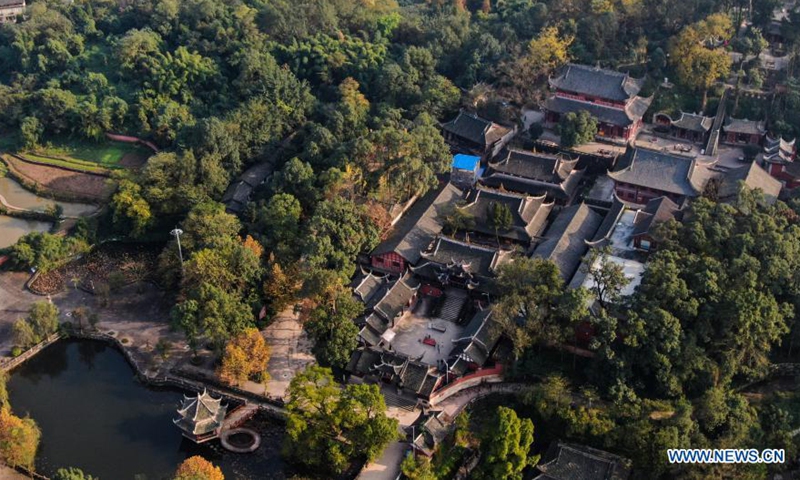
Aerial photo shows a view of the Dazu Rock Carvings scenic area at Dazu District of southwest China's Chongqing Municipality on Nov. 12, 2020. The scenic spot has seen an increasing number of tourists since its reopening in June, with some 2,000 a day. The carvings date from the 9th to 13th centuries and entered on the World Heritage List by the United Nations Educational, Scientific and Cultural Organization in 1999. (Xinhua/Liu Chan)
China’s protection of world heritage sites is significantly better than the international average, Chinese officials announced on Monday.
Yan Chengao, a deputy director of the National Forestry and Grassland Administration, said on Monday that China’s remarkable achievements in world heritage protection have been recognized by UNESCO and the World Heritage Committee.
According to a report released by the International Union for Conservation of Nature, among global world heritage sites, 63 percent have “good” and “relatively good” overall condition, but in China the rate is 89 percent. Seven percent of global heritage sites are in an endangered condition while the rate in China is zero.
Zhang Yiwu, professor of cultural studies at Peking University, told the Global Times on Monday that the reason why China could achieve such a good result is due to the success of Chinese culture as well as the degree of recognition from the government and the Chinese people.
“China is the fastest country in the world to apply for world natural and cultural heritage recognition, which shows that the Chinese government has paid a lot of attention in this area,” said Zhang.
China’s world heritage sites have helped Chinese people to improve their cultural confidence to some extent, and this has made them eager for international recognition of Chinese natural and cultural sites, he said.
He noted that China is likely to surpass Italy as the country with the most UNESCO World Heritage sites in the world. China currently boasts 55 UNESCO World Heritage sites, ranking top in the world alongside Italy.
According to Yan, the authority will hold two meetings about natural heritage sites at the 44th session of the World Heritage Committee of UNESCO on Saturday in Fuzhou, the capital of East China’s Fujian Province where the city Quanzhou in Zhejiang Province will be reviewed.
The first event will be held on Saturday, with the theme “World Natural Heritage and Biodiversity: Protection and Sustainable Development of Coastal Migratory Bird Habitats,” and the content will focus on helping migratory bird habitats and biodiversity, as well as discussing how to promote the protection, management and sustainable development of global coastal migratory bird habitats through international cooperation.
The second event will be held on July 26, with a theme of “Coordinated Protection of World Natural Heritage and Natural Reserves.” The authority will share the experience of coordinated protection, sustainable development of China’s nature reserves and the world’s natural heritage and the achievements in cross-regional collaborative management, ecological protection and scientific research.




